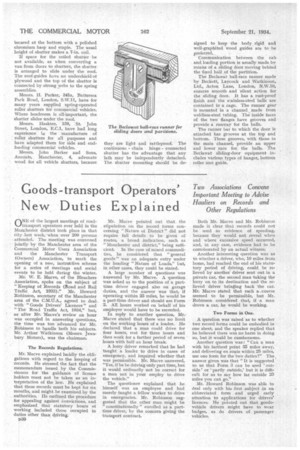Goods-transport Operators' New Duties Explained
Page 88

If you've noticed an error in this article please click here to report it so we can fix it.
Two Associations Convene Important Meeting to Advise Hauliers on Records and Other Regulations
ONE of the largest meetings of roadtransport operators ever held in the Manchester district took place in that city last week,' when over 200 persons attended. The meeting was convened jointly by the Manchester area of the Commercial Motor Users Association and the Manchester Transport (Owners) Association, to mark the opening ot a new, instruttive scheme for a series of meetings and social events to be held during the winter.
Mr. W. E. Macve, of the Bleachers Association, spoke on the subject of "Keeping of Records (Road and Rail Traffic Act, 1933)." Mr. Howard Robinson, secretary of the Manchester area of the C.M.U.A., agreed to dealwith "Goods Drivers' Licences" and "The Road Traffic Act, 1934," but, as after Mr. Macve's review an hour was occupied in answering questions, the time was too advanced for Mr. Robinson to hanclle both his subjects. Mr. Arthur Watkinson (Messrs. Jews.. bury Motors), was the chairman.
The Records Regulations.
Mr. Macve explained lucidly the obligations with regard to the keeping of records. He stressed the fact that the memorandum issued by the Commissioners for the guidance of licence holders must not be taken as an interpretation of the law. He explained that these records must be kept for six months, and might be examined by the authorities. He outlined the procedure for appealing against convictions, and emphasized that statutory hours of working included those occupied in duties other than driving.
X130
Mr. Macve pointed out that the stipulation on the record forms concerning "Nature of District" did not require full details to be given of routes, a broad indication, such as "Manchester and district," being sufficient. In the case of mixed commodities, he considered that "general goods" was an adequate entry under the heading "Nature of Loads," but, in other cases, they could be stated.
A large number of questions was answered by Mr. Macve. A question was asked as to the position of a parttime driver engaged also on garage duties, and the answer was that, if operating within 25 miles, he would be a part-time driver and should use Form 2. All hours worked on behalf of his employer would have to be recorded.
In reply to another question, Mr.Macve stated that there was no limit on the working hours of a loader. He declared that a man could drive for four hours, rest for three hours and then work for a further period of seven hours with half an hour break.
A lorry driver remarked that he had taught a loader to drive in cases of emergency, and inquired whether that was permissible. Mr. Macve answered, "Yes, if he be driving only part time, but it would ordinarily not be correct for a man not in your employ to drive the vehicle."
The questioner explained that he himself was an employee and had merely taught a fellow worker to drive in emergencies. Mr. Robinson suggested that the other man might be "constitutionally" enrolled as a parttime driver, by the concern giving the transport contract.
Both Mr. Macve and Mr. Robinson made it clear that records could not be used as evidence of speeding, because they would not reveal when and where excessive speed occurred, and, in any case, evidence had to be corroborated by an actual witness.
Another interesting question was as to whether a driver, who, 10 miles.from home, had reached the end of his statutory period of driving, could be reRoved by anotherdriver sent out in a private car, the second man taking the lorry on to its destination and the relieved driver bringing back the car. Mr. Macve stated that such a course seemed to be permissible, but Mr. Robinson considered that, if a man drove a car, he would be working.
Two Forms in One.
A question was raised as to whether two record forms could be embodied in one sheet, and the speaker replied that he believed there was no harm in doing so, but it would be cumbersome.
Another question was : "Can a man with his farthest point 35 miles away, and delivering en route within 25 miles, use one form for the two duties'?" The answer given was that "It is suggested to us that Form 8 can be Used outside ' or partly outside,' but it is difficult for us to say how far outside 25 miles you can go."
Mr. Howard Robinson was able to deal only with his first subject in an abbreviated form and urged early attention to applications for drivers licences. He pointed out that goodsvehicle drivers might have to wear badges, as do drivers of passenger vehicles.








































































































































































